The Golden Dawn or Thoth Method
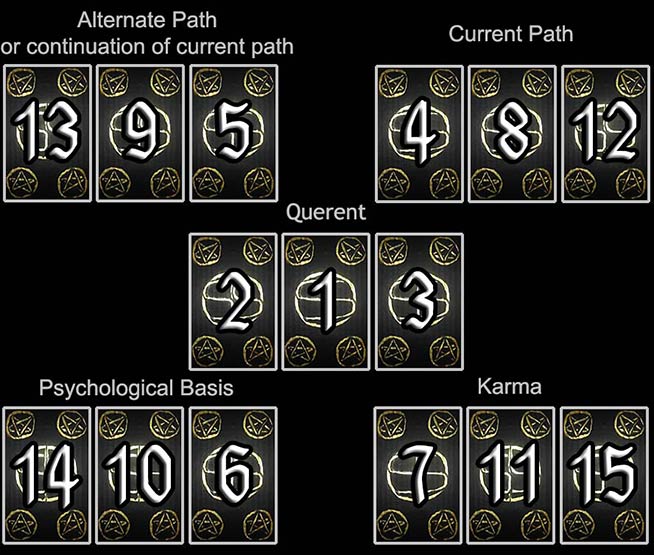
Difficulty: Complicated
Note: Tarot decks that use reversed cards such as the Rider-Waite do not work well with this spread, which was designed to be read using elemental dignity.
The Golden Dawn spread is best suited for use with the bifrost Tarot and especially the Book of Thoth, as these decks are meant to be read a certain way with the court cards. Princes and queens represent actual men and women connected with the matter, while princesses generally represent ideas; thoughts or opinions, and knights represent arrival or departure of a matter depending on the direction faced.
In this tarot spread, particular attention should be paid to a card's exact position in relation to its neighbours. Whether the neighbour cards bear the same energy (suit) determines whether a card is considered well-dignified or ill-dignified. Opposite suits ill-dignify each other, while other suits are considered friendly. Tarot cards of the same suit or element strengthen each other.
As with other tarot spreads, it is important to count the cards' tendencies, such as whether there is a lot of one particular suit or number pattern. The patterns reveal special messages. Having several majors present indicates higher forces at work, several cups suggest strong emotions, etc.
Card #1 represents the reader and the nature of the topic at hand.
Cards #2 & #3 are read in extension of #1 to further comprehend the nature of the topic.
The two sets of three tarot cards at the top of the spread represent chronological sets of events. The current path as it would unfold naturally is represented by cards #4, #8, & #12. The alternate path that could be taken is represented by cards #13, #9, & #5. However, if the reader gets the feeling these cards are telling them they go together, then the alternate path is to be considered an extension of the current path, and to be read chronologically in this order: #4, #8, #12, #13, #9, #5. Just keep in mind: this is only if the two paths seem particularly similar.
Cards #14, #10, & #6 shed light upon the psychological undertones of the current issue.
Cards #7, #11, & #15 represent the influences of karma and destiny beyond the reader's control. These cards suggest adapting to this, as fate.
Your Golden Dawn Reading
| The Alternate Path (or Extension of Current Path) |
Your Current Path |
|||||
King of Cups |
Seven of Swords |
Two of Cups |
Knight of Swords |
Eight of Stakes |
King of Swords |
|
| The Querent | ||||||
0. The Fool |
Nine of Swords |
Eight of Swords |
||||
| The Psychological Basis | Karma | |||||
Queen of Pentagrams |
Nine of Cups |
Knight of Pentagrams |
Seven of Stakes |
VII. The Chariot |
Four of Stakes |
|
The Querent
cards represent the querent and the nature of the topic at hand. The first card (in the center of the spread) represents the very core of the matter, and the other two cards around it are added to it in order to further comprehend the nature of the topic.
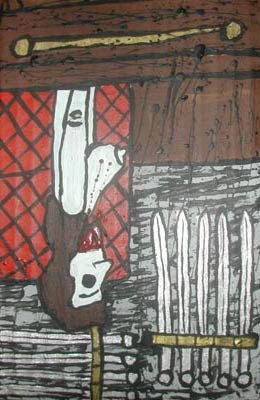
Reversed
Symbolism:
Nine swords hang ominously on the wall, their sharp edges glinting faintly in the dim light. Below, a female vampire clutches her chest, overwhelmed by anxiety. Her surroundings are fortified excessively, reflecting her insecurities and fears of vulnerability. The scene captures a suffocating sense of dread and the heavy toll of mental anguish.
Meaning:
The Nine of Swords represents anxiety, fear, and despair. It signifies sleepless nights, obsessive thoughts, and the burden of worries that may or may not be grounded in reality. This card calls attention to the self-inflicted nature of some fears, urging reflection and perspective.
Reversed, the Nine of Swords suggests release from these burdens or the ability to confront and process your fears. It can also indicate being trapped by negativity or the lingering effects of past trauma that remain unresolved.
Keywords:
Reversed: Emotional release, recovery, clarity, lingering negativity, shame.
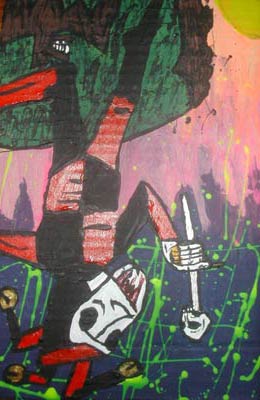
Reversed
Symbolism:
The Fool is depicted as a pale, ethereal figure walking a misty, crumbling path, a bundle tied to a staff slung over their shoulder. They gaze skyward, unaware of the jagged cliff at their feet. A spectral wolf follows close behind, snarling a silent warning. Overhead, a full moon illuminates their journey, hinting at the mystery and potential of new beginnings. In their hand, a delicate white rose symbolizes innocence and purity.
Meaning:
The Fool represents beginnings, spontaneity, and boundless potential. It urges you to take a leap of faith, trusting in the journey ahead. While the path may be uncertain, embracing the unknown opens the door to growth, discovery, and self-expression.
Reversed, the Fool warns of recklessness, naivety, or hesitation. It suggests the need to pause and consider potential consequences before plunging ahead.
Keywords:
Reversed: Recklessness, foolishness, naivety, hesitation, fear of the unknown, poor judgment.
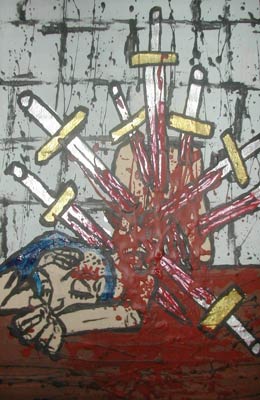
Symbolism:
A young woman lies motionless, stabbed from both the front and the back by swords. Unlike a self-inflicted fate, the wounds reveal a betrayal or attack from all sides, symbolizing entrapment and the powerlessness that stems from external forces.
Meaning:
The Eight of Swords signifies mental entrapment, limitation, and the feeling of being cornered. It highlights the power of negative thoughts or external pressures that leave you paralyzed. However, the card reminds you that escape is often possible if you change your mindset or perspective.
Keywords:
Upright: Restriction, entrapment, fear, helplessness, crisis, mental conflict.
Your Current Path
cards represent your current path as it would unfold naturally. These cards are read in chronological order from left to right.
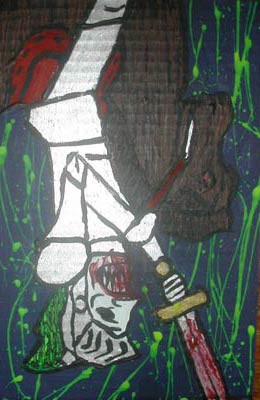
Reversed
Symbolism:
A pale Knight rides a dark horse at breakneck speed, his face etched with fear. It is not fear of the world, but fear of the destructive potential he knows lies within himself. The stormy skies around him reflect the chaos and intensity of his internal conflict.
Meaning:
The Knight of Swords represents swift action, bravery, and the pursuit of truth or justice. It signifies decisiveness, energy, and the willingness to confront challenges head-on. This card often appears during moments of intense effort or when boldness is required.
Reversed, the Knight of Swords suggests recklessness, impulsiveness, or the consequences of acting without a clear plan. It warns against self-destructive tendencies or overconfidence that leads to ruin.
Keywords:
Reversed: Recklessness, impulsiveness, self-destruction, lack of control, chaos.
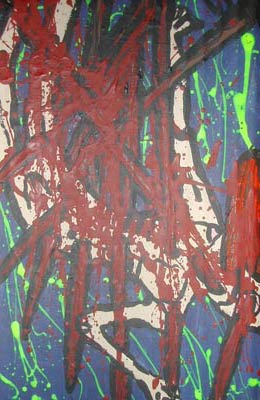
Reversed
Symbolism:
A woman impaled by stakes showcases the cruel extremes of humanity. The stakes, angled as if in motion, represent swiftness and urgency. The scene hints at a world in constant flux, with events moving at an uncontrollable pace.
Meaning:
The Eight of Stakes represents rapid movement, action, and the culmination of efforts. It suggests that things are falling into place, and progress is accelerating toward your goals. This card encourages you to stay focused and prepared for opportunities that arise swiftly. It may also indicate travel, communication, or the arrival of significant news.
Reversed, the card points to inner turmoil, quarrels, or jealousy disrupting progress. It may also indicate delays or an inability to move forward due to unresolved issues.
Keywords:
Reversed: Delays, jealousy, conflict, stasis, miscommunication.
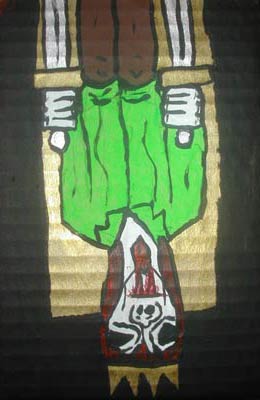
Reversed
Symbolism:
The King of Swords sits on his throne, holding two swords of justice crossed in front of him. His gaze is piercing and authoritative, reflecting a mastery of reason and balance. The environment around him is austere, emphasizing his focus on logic, law, and the pursuit of truth. His presence radiates power, intellect, and discipline.
Meaning:
The King of Swords symbolizes authority, rationality, and the power of thought. He embodies clarity, fair judgment, and leadership, urging you to approach situations with logic and integrity. This card often appears when strong leadership or impartiality is needed to resolve a conflict or make a critical decision.
Reversed, the King of Swords suggests abuse of power, cruelty, or arrogance. It may indicate someone who uses intellect or authority for selfish or harmful purposes. This card warns against being overly rigid, manipulative, or detached in your interactions.
Keywords:
Reversed: Abuse of power, arrogance, cruelty, manipulation, rigidity, dishonesty.
The Alternate Path
cards represent the alternate path that you could choose to take in lieu of the Current Path. However, if the cards that come up seem to indicate that they go along with the Current Path, these three cards should be interpretted not as an Alternate Path, but as a chronological extension of the Current Path (also read from left to right).
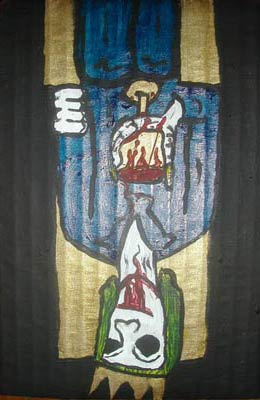
Reversed
Symbolism:
Seated upon his throne, the King clasps a full chalice in hand. The King embodies emotional mastery, wisdom, and balance, symbolizing the ability to rule over emotions and guide others with compassion.
Meaning:
The King of Cups represents emotional maturity, control, and wisdom. He is a master of his feelings and uses his emotional intelligence to guide others. This card signifies someone who is emotionally stable, compassionate, and deeply understanding. The King offers counsel, support, and emotional protection to others and is often a symbol of balance in relationships and emotional wellbeing.
Reversed, the King of Cups can signify emotional dishonesty, manipulation, or a lack of self-control. It points to someone who uses emotions to manipulate others, or it may indicate emotional repression or being emotionally unavailable.
Keywords:
Reversed: Emotional dishonesty, manipulation, emotional repression, instability.
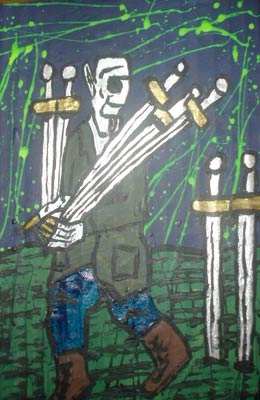
Symbolism:
A cunning thief is shown stealing five of seven swords, his movements calculated and deliberate. He takes only what he can carry, leaving just enough behind to avoid detection. This image portrays strategy, cleverness, and moral ambiguity, reflecting the complexity of navigating difficult situations.
Meaning:
The Seven of Swords represents strategy, cunning, and the courage to take calculated risks. It suggests that bold action may be necessary to achieve your goals, even if it challenges conventional ethics. The card also highlights the importance of discretion and planning in overcoming obstacles.
Keywords:
Upright: Strategy, cunning, cleverness, calculated risk, bravery, justified action.
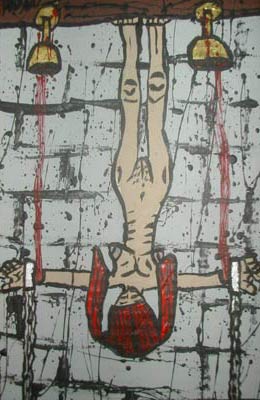
Reversed
Symbolism:
A young, nude female chained to a dungeon wall is drained of her life force, which fills two cups symbolic of a master's love for bloodlust. The connection between the figures emphasizes emotional entanglement, power dynamics, and the intertwined nature of love and suffering.
Meaning:
The Two of Cups is a card of deep emotional connection, partnership, and harmony. It signifies love, mutual respect, and the bonding between two individuals, whether in a romantic or platonic context. It is the union of two hearts, often indicating the beginning of a significant relationship or partnership.
Reversed, the card signals imbalance, unhealthy attachments, or an abusive relationship. It can also reflect disunity or an emotional bond that has become toxic.
Keywords:
Reversed: Imbalance, toxic relationships, disunity, unhealthy attachments.
The Psychological Basis
cards shed light upon the psychological undertones of the current problem.
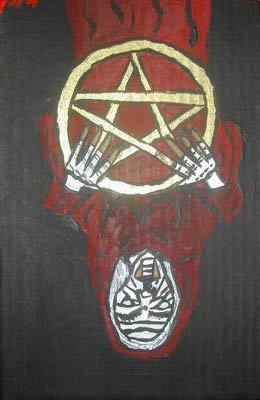
Reversed
Symbolism:
An older woman bears a large pentagram, symbolizing wisdom, wealth, and self-awareness. She exudes authority and grace, with a deep connection to both material success and personal power.
Meaning:
The Queen of Pentagrams embodies wealth, wisdom, and self-sufficiency. She suggests that you have reached a level of maturity where you can balance both material success and personal fulfillment. This card highlights nurturing, practicality, and the importance of enjoying the fruits of your labor.
Reversed, it reflects mistrust, doubt, or fear. It may suggest that you are overly concerned with appearances or that you fear losing control over your circumstances.
Keywords:
Reversed: Mistrust, fear, lack of control, insecurity.
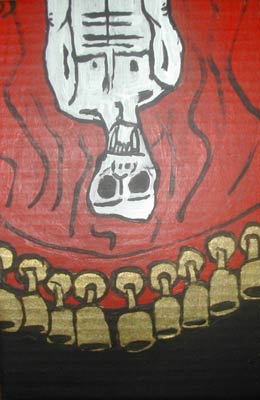
Reversed
Symbolism:
A male vampire sits at the peak of drunken contentment, a symbol of ultimate satisfaction and indulgence. The cups around him represent the emotional fulfillment that results from victory and excess.
Meaning:
The Nine of Cups represents emotional satisfaction, contentment, and fulfillment. It indicates that your desires are being met and that you are experiencing joy in its fullest form. It can also be a sign of physical satisfaction or emotional abundance, often linked to wishes being granted.
Reversed, it warns of complacency, indulgence without fulfillment, or shallow pleasures that fail to bring long-lasting happiness.
Keywords:
Reversed: Complacency, shallow pleasures, unfulfilled desires, indulgence.
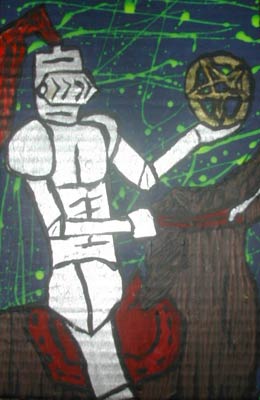
Symbolism:
A knight bearing a pentagram signals the arrival of important news, symbolizing responsibility, discipline, and service. His steady demeanor suggests that success is achieved through diligent work and careful planning.
Meaning:
The Knight of Pentagrams represents service, responsibility, and a strong work ethic. It suggests that you are in a position to fulfill your obligations and take care of important matters. This card encourages patience and diligence in your endeavors.
Keywords:
Upright: Responsibility, diligence, service, hard work, reliability.
Karma
These cards represent the influences of karma and destiny that are beyond your control. They suggest adapting to this fate.
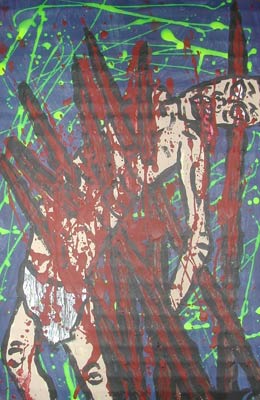
Symbolism:
Seven stakes hold yet another of Vlad's impaled victims, a stark message to those who would challenge his authority. The grim imagery portrays valor and defiance in the face of overwhelming odds. The stakes symbolize both the challenges and the power of standing one's ground.
Meaning:
The Seven of Stakes is a card of courage and determination. It urges you to stand your ground and defend your beliefs, even when faced with opposition. Success is possible, but it requires resilience and confidence in your convictions. This card often appears when there is competition or conflict, serving as a reminder to hold firm.
Keywords:
Upright: Valor, perseverance, defiance, determination, strength.
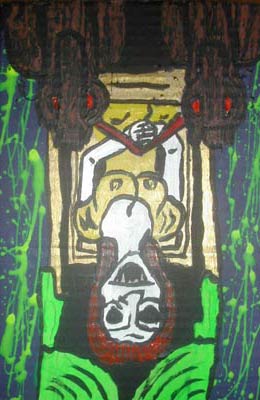
Reversed
Symbolism:
The Chariot is a sinister yet majestic vehicle drawn by two spectral horses, one black and one white, representing opposing forces. A Nosferatu figure stands at its helm, cloaked in shadows, holding a whip of shadowy tendrils. The chariot races through a mist-laden nightscape, its wheels crushing fallen leaves and brittle bones, symbolizing the journey's sacrifices and challenges.
Meaning:
The Chariot signifies determination, control, and the will to overcome obstacles. It calls for focused effort and harnessing conflicting energies to achieve a goal. This card often appears when decisive action and self-discipline are needed to navigate a complex situation. It encourages you to take charge of your direction and steer with purpose.
Reversed, the Chariot warns of recklessness, a loss of direction, or being overwhelmed by opposing forces. It may also point to a lack of confidence or an inability to move forward.
Keywords:
Reversed: Lack of control, recklessness, stagnation, self-doubt, misdirection, failure to progress.
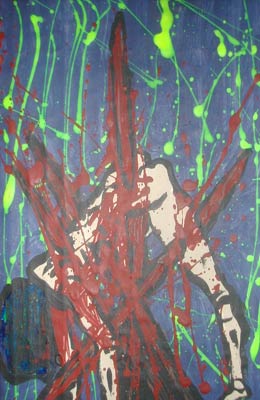
Symbolism:
A nude figure hangs suspended mid-air by four bloody stakes. This haunting tableau evokes themes of rest, stability, and a grim sense of harmony. The stakes form a secure structure, suggesting that even amidst horror, there can be moments of peace and reprieve.
Meaning:
The Four of Stakes symbolizes a haven or moment of stability amidst chaos. It represents harmony, home, and the celebration of achieved milestones. This card is a reminder to cherish moments of peace and recognize the beauty in completion. It signifies prosperity and contentment within your personal or professional life.
Keywords:
Upright: Stability, harmony, home, celebration, peace, completion.
